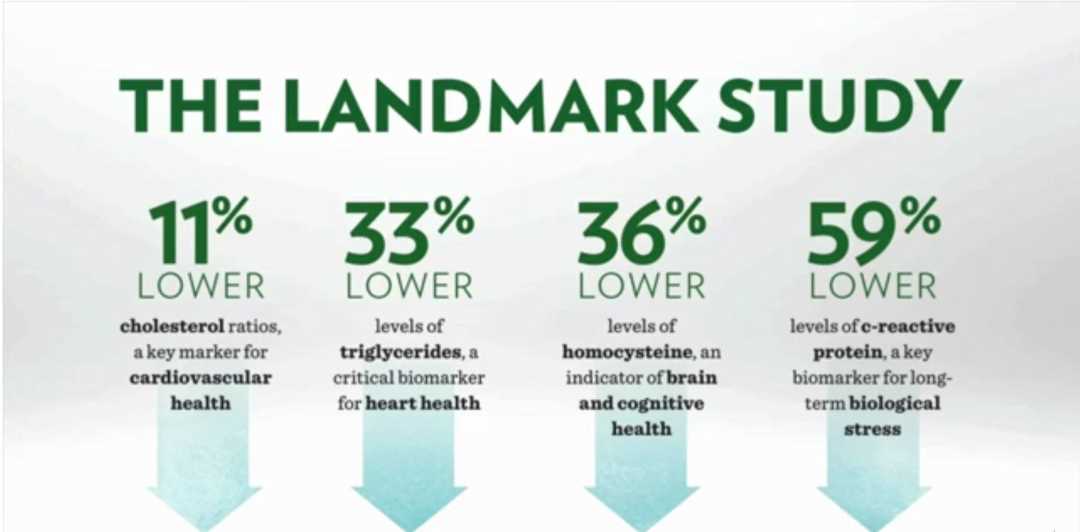Shaklee’s Landmark 50th Anniversary Study

As part of its 50th Anniversary, Shaklee commissioned the largest study ever conducted in the dietary supplement industry and the first ever on long-term dietary supplement users of 20 years.
This study was led by Dr. Gladys Block, renowned nutrition researcher and epidemiologist, and conclusively showed that people who took Shaklee supplements had markedly better health than both users of other popular brands and non supplement users.
When it comes to using Shaklee supplements to help prevent major diseases, the results are impressive and speak for themselves.
The study featured 1,000 participants and all data was extracted from the NHANES study *** (see footnote)
Average Age
Users of Other Vitamins: 57
Users of Shaklee Supplements: 64
High School Education or higher
Users of Other Vitamins: 55%
Users of Shaklee Supplements: 86%
Incidence of Heart Disease
9.8%
Users of Other Vitamins
5.0%
Users of Shaklee Supplements
Incidence of heart attacks
9.1%
Users of Other Vitamins
2.5%
Users of Shaklee Supplements
Congestive heart failure
5.1%
Users of Other Vitamins
1.4%
Users of Shaklee Supplements
Incidence of Type-2 Diabetes
11.6%
Non-supplement user
13.1%
Users of Other Vitamins
2.9%
Users of Shaklee Supplements
# of medications for those over 65 yrs.
???
Users of Other Vitamins
0.6
Users of Shaklee Supplements
Participants were asked if they felt good about their health
Users of Other Vitamins: 48%
Users of Shaklee Supplements: 85%
Shaklee supplement users also retained normal levels of blood pressure, HDL cholesterol, triglycerides, homocysteine, plus ZERO abnormal levels of C-reactive proteins (a key indicator for inflammation and heart disease), while non supplement users and users of other vitamins on average did not.
Natural question raised -- Who was in control of the Study?
Answer
Shaklee had to go through a number of hurdles to get this study completed. The premier research institution that had experience with the NHANES study was UC Berkeley with Gladys Block.
Dr. Block is considered one of the top epidemiologists in the country. We wanted to use the NHANES data and add a third arm to this study as NHANES is considered the most reputable study of its kind ever done.
We proposed to Dr. Block and UC that we add an extra arm to the study for long term supplement users. Dr. Block’s organization required full control over how the study was to be conducted, had full control over the study write up results, and also had full control on publishing the study – whether or not the results were going to be beneficial to Shaklee.
We had to pay for the study, but if we had a bad outcome (which we hoped wouldn’t happen) the study would have been published.
UC Berkeley ran all the statistics, analyzed all the blood draws and wrote the study, and had 100% control of publishing any outcome (good or bad).
Next step was for UC Berkeley was to contact a publisher. We wanted them to use a peer reviewed publication, which means that other 3rd party scientists review everything UC Berkeley did to punch holes in the data.
This review process goes on over several months with questions from the reviewing scientists and requests for clarification … the importance of doing ‘peer review’ studies is that these are the gold standard for clinical trials, because you have an independent scientific panel of experts scrutinizing the data to make sure that it is absolutely accurate when published.
I guarantee any other company would NOT have done this study, because they would be concerned about the possible outcome.
We believed in our products and gave UC Berkeley full control … you should be extremely proud of the results and because it will be ‘peer reviewed’ nobody should argue with you regarding the merits of the data.
All the best,
Cindy Latham
SVP of Marketing Shaklee Corporation
Gladys Block, Ph.D.
 Professor of Epidemiology and Public Health Nutrition
Professor of Epidemiology and Public Health Nutrition
PHONE: (510) 643-7896
FAX: (510) 643-6981
LOCATION: 207-B University Hall
E-MAIL: gblock@berkeley.edu
Research Interests
- Vitamin C and cardiovascular disease risk factors
- Antioxidants and oxidation
- Nutrient status and disease relationships
- Online and computerized methods to help people eat better and be more physically active
- http://sph.berkeley.edu/faculty/block.html
NHANES Study
National Health and Nutrition Examination Survey - http://www.cdc.gov/nchs/nhanes.htm
Since 1959, the National Center for Health Statistics (NCHS) has been continuously monitoring the health status of the US population through a nationally representative survey utilizing health interview and physical examination data.
The populations surveyed and questionnaire topics have evolved over time to accommodate a variety of public health and research priorities.
The NHANES program is unique in that it combines interviews with physical examinations and laboratory studies. NHANES adopted these three data collection modes to maximize the efficiency, quality, and accuracy of data collected.
References
Published 24 October 2007 -- Nutrition Journal, Nutrition Journal 2007, 6:30doi:10.1186 / 1475-2891-6-30
http://www.nutritionj.com/
http://landmarkstudy.com